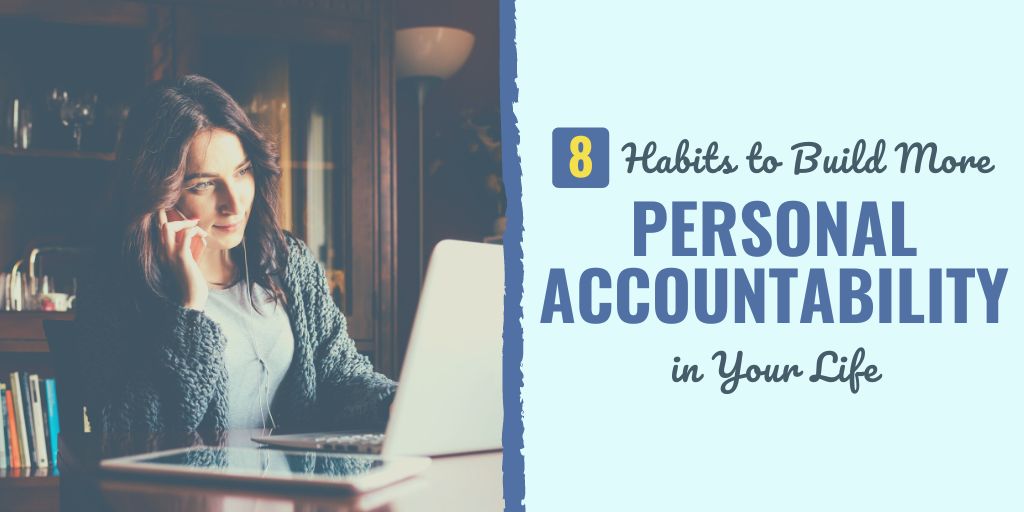When things don’t turn out the way you want or expect, it's easy to deny your role in the situation and look to external factors to blame.
And while circumstances, other people’s actions, and even luck can impact your personal and professional lives, refusing to accept accountability can prevent you from ever achieving your full potential.
Making excuses and blaming others can certainly give you some short-term relief, but it blocks any potential growth or improvement that you could make–and it doesn’t teach you how to avoid the problem in the future.
But what can you do to build more personal accountability?
Well, in this article, we are going to look at how you can build more accountability in your life and start taking ownership over the results that you produce–both positive and negative.
But first, let’s take another look at what accountability is.
What Is Personal Accountability?
Accountability isn’t about accepting blame when things go wrong. It’s about delivering on your promises. It’s accepting responsibility for an outcome rather than a set of tasks. It’s being proactive with intentional and strategic follow-through.
How would you like to work in an organization where everyone does what they say they’ll do? If you’re like 85% of the working population, you don’t feel like you’re currently working somewhere where employees are engaged with their work.
When you’re in a professional culture that embraces personal accountability, not only do people do what they say they will do, they also hold each other accountable to ensure their organization remains credible for clients or customers.
Without taking personal accountability, you’re likely working in a culture full of blame, where you figure mediocre is good enough, goals are vague, and you spend more of your energy trying to beat the system than you spend on doing your job well.
But having personal accountability isn’t just helpful in your professional life, it can also benefit you in your personal life.
We’ve gone over the difference between accountability and responsibility before, but just to review, your personal responsibilities refer to the things that you’re required to do to earn a paycheck. These tasks define other people’s expectations of you.
On the other hand, if you have accountability, you accept the outcome that you’ve worked for–whether that’s good or bad. Having a sense of accountability is knowing that when your responsibilities are complete, you have to answer to someone for your work.

There are a lot of definitions of accountability out there, but knowing what accountability means doesn’t equate to maintaining it as a value in your life. But while personal accountability may be defined in several ways, all of the definitions have a few common factors.
Everyone who defines this concept agrees that having accountability involves making a commitment to feel empowered to accept ownership of your tasks.
There are several reasons why you may be looking for how to build more accountability in your life.
Studies show that when employees lack personal accountability in a professional environment, low employee morale is likely to follow, along with reduced productivity and a higher rate of employee turnover.
Further, there is a direct relationship between employees’ sense of personal accountability and the overall performance of an organization.
Essentially, when employees have a strong sense of personal accountability, they perform better than those who lack this trait.
In turn, according to the United States Office of Personnel Management, organizations that promote accountability among their employees outperform others that aren’t proactive about supporting individual accountability.
When something goes wrong and you find that you typically become upset, look the other way, or shut down in response, you’re displaying defense mechanisms to avoid having to face the situation.
When faced with the opportunity to take on more responsibility, you may think things like “I’m not good enough” or “I don’t know how.” However, what’s at the root of those thoughts is, “I’m not willing to try.”
Here are some signs that you need to build more personal accountability in your life:
Let’s take a look at why you should want to build more personal accountability in your life.
Why Build Personal Accountability?
When you have personal accountability, you’re eager to take charge of your life, tackle new challenges, and reap the benefits of facilitating a success of some sort.
You’re constantly wondering, “What can I do to make this better?” and, “What can I learn from this mistake?”
Everything that happens in your life is a direct result of your actions. And it’s only when you can take 100% responsibility for your choices that you will lead a meaningful and fulfilling life. When you stop blaming external forces, you can redirect that energy to focus on creating a better situation for yourself.
You have to understand and accept that you’re the one who is in charge of your circumstances because this will encourage you to be proactive in making a change for the better.
Once you accept accountability, you will genuinely believe the truth–which is that everything around you is the outcome of your decisions.
Let’s take a look at some specific habits you can adopt to build more personal accountability in your life.
8 Habits to Build More Personal Accountability in Your Life
1. Make a Commitment
The first step to building accountability is deciding what you want to achieve, which will then make it clear what you’re staying accountable for.
Once you’ve decided, you have to make a commitment to being personally accountable–this isn’t really something that can come and go. You need to be able to commit to the following:
Often, your commitments have to be to yourself to make a change. If you’re unhappy with an aspect of your life, step out of your comfort zone to initiate a change.

And while it may be difficult to change something that you’re used to, remember that it’s your choice to do nothing but complain rather than take action, but that’s not going to improve anything.
When you make a commitment, it means that you are going to follow through with something until the very end. You’re removing the things in your environment that may be distractions. You understand the decision has been made and there’s no turning back now.
2. Gain Clarity
When trying to gain accountability, many mistakenly start by listing the tasks that they will be held accountable for. However, one of the first things you should do is specifically define people’s expectations of you (or your company).
This means you have to break your objectives down to the point where there is no room for interpretation about what the outcome should look like.
In order to genuinely assume accountability for your actions, you’ll need to know exactly what’s expected from you.
If there is a misunderstanding between what you’re aiming for and the outcome that someone else is expecting, at least one person is sure to be disappointed in the end. If you are in a leadership position, make sure to explain to your subordinates exactly what you need from them.
When identifying your end goal, clarify where you are vs. where you need to be in order to establish your baseline so you can measure your progress along the way. And then get your team focused on the necessary actions that must be taken to get it done.
3. Be Realistic
If you overcommit yourself, not only are you likely to forget something important, you also may start cutting corners in your work to get it done faster. This will only decrease the quality of your outcomes, so be sure to know your limits and be realistic when making commitments to others.
And, because having personal accountability is a choice that you have to accept, this means that you need to learn to say no when it’s necessary.
You can’t agree to do everything that’s asked of you and expect it to be done well, so if you’re trying to build personal accountability–and you want that accountability to be rewarding–you need to be realistic about how you plan to distribute your time.
4. Create SMART Goals
To build personal accountability, you must work on setting goals. When you can, set SMART goals so you can measure your progress as you go.
When you know exactly how you’re going to complete your goals, you’ll be able to measure your progress and assume accountability for what you have and haven’t done to achieve your goals.
Your SMART goals are specific, measurable, achievable, relevant, and time-bound. With this in mind, you know that you will need a clear deadline in order to claim victory.
The video below provides a quick overview of SMART goals and then show three examples for each of the seven areas of your life.
Since this is the case, you need to make proper progress along the way and reach your smaller objectives so you’re moving forward toward success, which requires that you hold yourself accountable.
Having personal accountability is the only way you will reach any of your goals, but you have to start with creating those goals (and determine the “why” behind each goal) to give you the motivation (and time limit) to get to work.
You will see that having personal accountability pushes you to get things accomplished and see the outcomes you were hoping for.
5. Eliminate Blame
No matter what, you will have setbacks when you’re working toward your goals. But when you’re facing a hurdle, you can’t look to external sources to blame for the issue.
And while you don’t have to beat yourself up and assume all fault for everything that goes wrong, you do need to feel the necessary empowerment to reflect on what went wrong and figure out how you can make things turn out differently in the future.
You have to be able to recognize that you control your actions and whatever outcomes result.
Finally, if necessary, you need to be able to admit fault to other people. Put your pride aside and practice doing this. Apologize if you need to, and tell people how you plan to make things right in the future.
6. Practice Holding Yourself Accountable
When you have accountability, there is someone (or many people) who are looking to you for an end result. People are counting on you.
To get used to this, start counting on yourself. If you were your manager, would you think you’re earning the salary you’re making? Are you meeting the goals that your company has laid out for you? Are you billing enough hours or signing on enough clients?
Hold yourself accountable for what you do with your time. Review your to-do list frequently so you can see what you’ve accomplished and what got left behind.
You can do this in your personal life as well. Reflect on your eating and exercising habits, the amount of time you spent reading, or how closely you stuck to your budget every week.
Then plan how you can fill in any gaps next week by making improvements to how you choose to spend your time or focusing on another factor that’s impacting your progress.
To help you get better at this, here are some of the best accountability worksheets you can use.
7. Feedback, Feedback, Feedback
Accountability requires ongoing feedback. You need to hear what you’re doing well and what you need to improve. So create formal systems and processes so you don’t miss this critical step.
Feedback should be given (or sought out) every day. You must look at your actual performance toward the desired outcome so you can continue to define what “winning” looks like.
Seek feedback from others, including the opinions of coworkers, friends, and clients. Other people’s opinions will give you insight that will give you the necessary tools to succeed.
Accept the fact that how you see yourself may be very different from how other people perceive you. Ask others to give you an honest evaluation of your job performance, and even look to clients or customers to help understand what you’re doing right and where you can make a change.
8. Get an Accountability Partner
One of the best ways to build more personal accountability is to find an accountability partner who will follow along with your progress.
An accountability partner is a peer who helps you reach your goals by offering guidance and making sure you do what you say you’re going to do.
The video below discusses the benefits of having an accountability partner and the five-step process for having long-term success with this type of arrangement.
This is similar to having a mentor, however, this is a mutually beneficial relationship in which both people benefit from the feedback and support of their partner.
Your accountability partner will give you individualized help with your goals and they will be focused on your success–and vice versa.
You and your accountability partner will agree to support, coach, and provide feedback on a regular basis for one another. You will share your accomplishments with each other, discuss challenges, and offer some words of encouragement.
Final Thoughts for Building Personal Accountability
Building personal accountability doesn’t have to be scary or involve a lot of self-blame. Instead, making the decision to do this should mark an empowering transition to a new phase of your life where you can gain control of your time and the person that you want to be.
Follow the tips laid out in this article to build accountability in your life and regain that sense of control that feels so out of reach. Making the shift to being personally accountable requires some work and change, but you will find the results to be worth the effort.
And if you're working on adding more or improving values in life, be sure to check out these articles:
- How to Find and Define Your Family Core Values
- 8 Rules to Be More Consistent in Life
- 27 Habits to Develop the Growth Mindset in Your Life
Finally, if you want to take your goal-setting efforts to the next level, check out this FREE printable worksheet and a step-by-step process that will help you set effective SMART goals.

Connie Mathers is a professional editor and freelance writer. She holds a Bachelor's Degree in Marketing and a Master’s Degree in Social Work. When she is not writing, Connie is either spending time with her daughter and two dogs, running, or working at her full-time job as a social worker in Richmond, VA.


